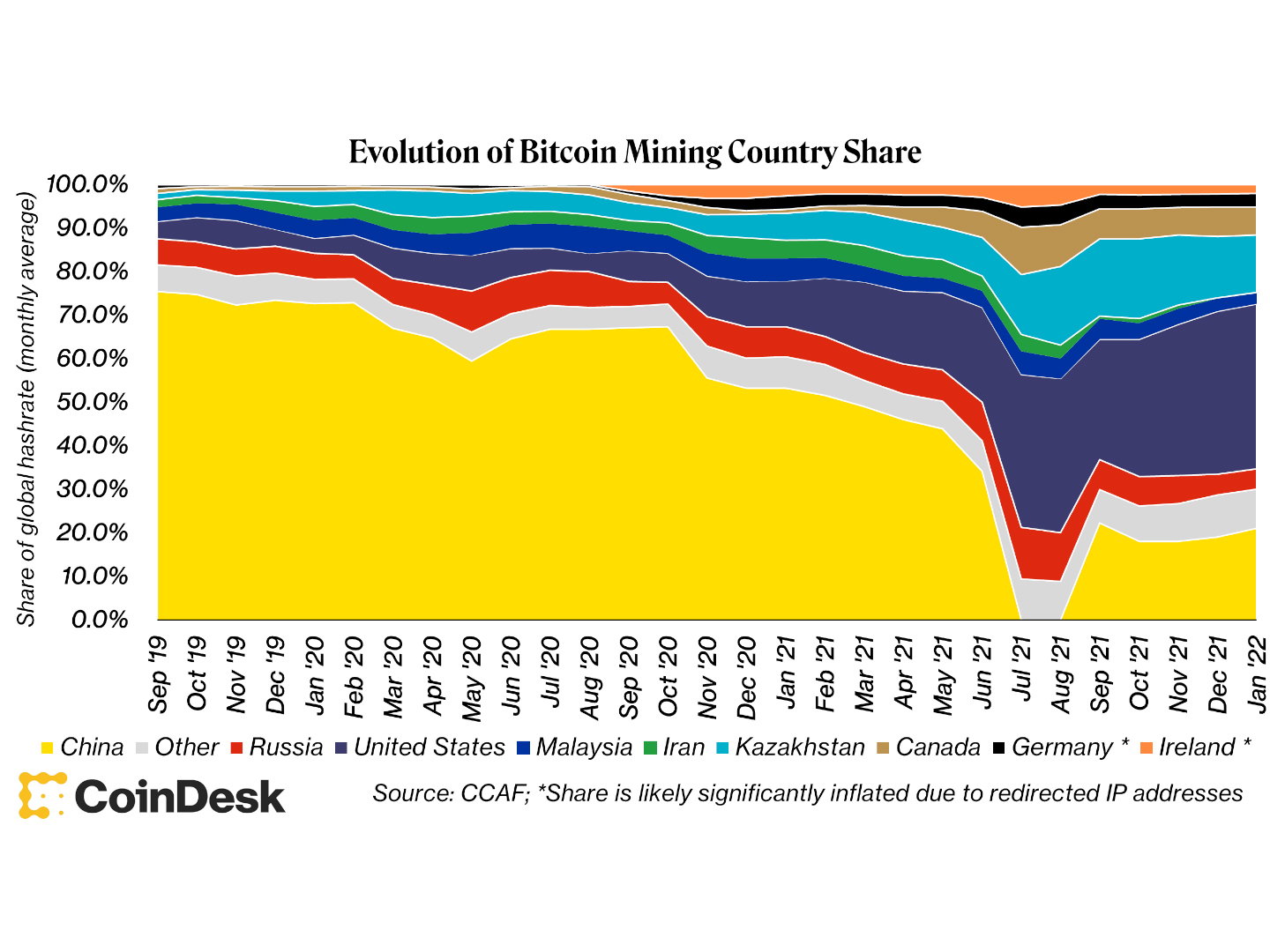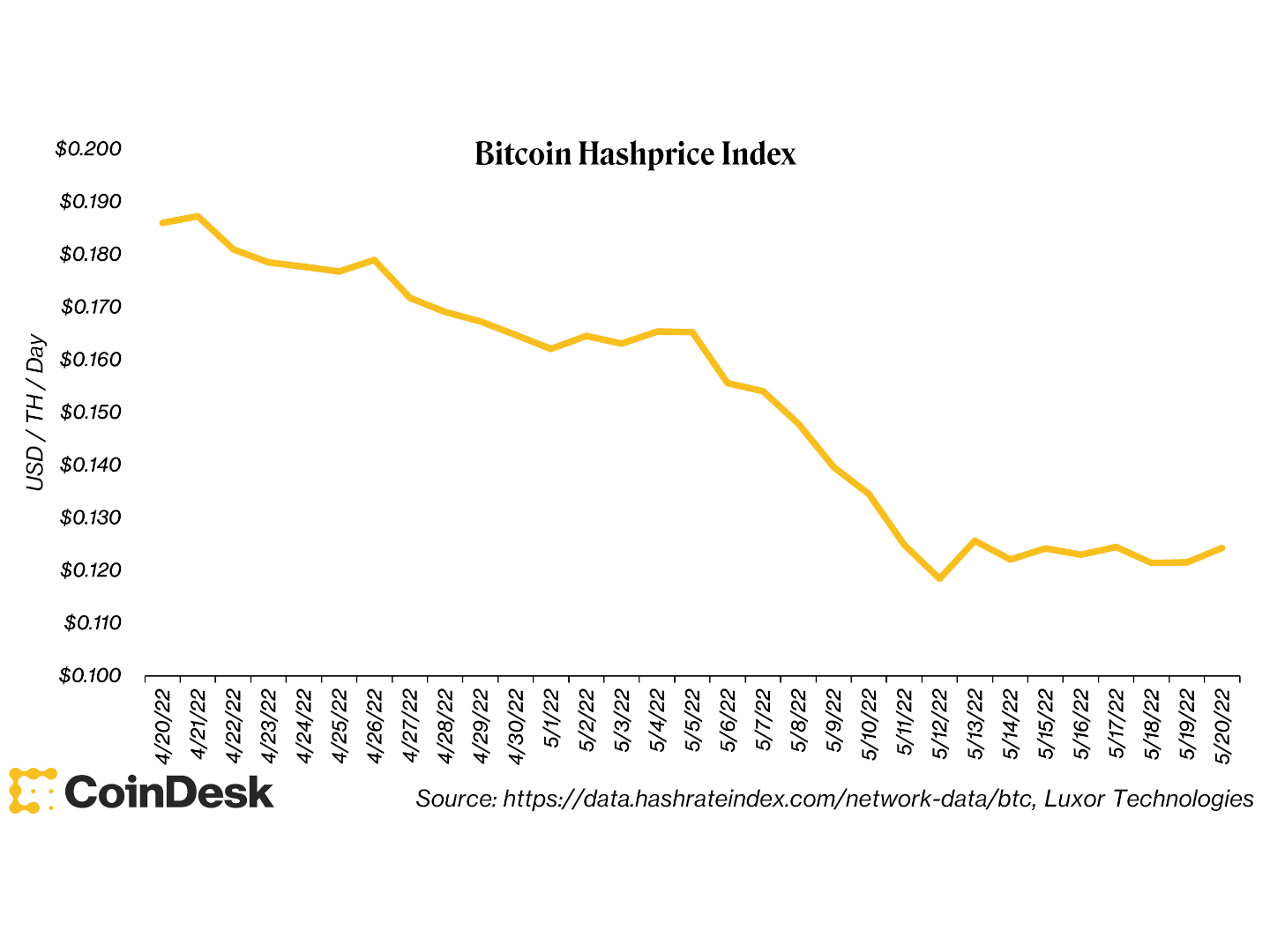MicroStrategy's Significant Bitcoin Impairment Losses May Mislead: Berenberg
Bitcoin Approaches Formation of Death Cross as Dollar Index Hints at Golden Crossover
SEC Finds 'No Grounds' to Deny Conversion of Bitcoin ETF, Grayscale Says
Last week, the Cambridge Centre for Alternative Finance (CCAF) at Cambridge University released an update to its widely recognized (and justifiably so) Cambridge Bitcoin Electricity Consumption Index (CBECI), which aims to find and disclose the global geographic distribution of bitcoin miners.
Following a crypto mining ban in China, China's proportion in mining dropped from 34.3 percent in June 2021 to 0.0 percent in July 2021, according to the recent Cambridge report. According to last week's update, China's mining share increased from 0.0 percent in August 2021 to... 22.3 percent in September 2021.
Something is clearly wrong here, so let's investigate. We'll also discuss two more bitcoin mining-related subjects while we're there: Hashprice and mining business problems are the first two.
The research shows that China stopped bitcoin mining in May 2021. By July, almost no miners were working in China. There was also none in August. Then, in September, nearly all of the miners who had left returned. That is, at least, what the data indicates:

(Cambridge Centre for Alternative Finance)
Perhaps that isn't evident, so I'll state it: That did not occur. It's not easy to relocate mining operations. The majority of mining operations aren't a few idling amateurs; Bitcoin has progressed well beyond that. Most miners are more appropriately classified as commercial businesses, paying triple net leases for warehouse space and relying on complicated power purchase agreements for power.
This is how bitcoin mining operations look:

(Sandali Handagama/CoinDesk)
The data appears like this because of the CCAF's data collection approach. The CCAF teamed up with bitcoin mining pools to gather geolocational data on mining facilities based on IP addresses (pools allow a lot of different miners to contribute to mining, and the reward is then split among them according to their processing contribution to smooth out individual miner income). It is no secret in the market that [miners] in particular places utilize virtual private networks (VPNs) or proxy services to disguise their IP addresses in order to obscure their location, as the CCAF warns: Such behavior may skew the sample, causing hashrate to be overestimated (or underestimated) in specific provinces or nations.
So the genuine tale of what happened here, in my opinion, is very uninteresting.
1. Chinese miners feared retaliation from the authorities, so they lied or faked their location data and relocated underground.
2. After some time, Chinese miners concluded, "Hey, this isn't so dangerous," and they felt safe providing their real data.
That's it. As I already stated, it's actually rather boring.
However, this isn't entirely accurate. The more well-known bitcoin mining companies did relocate at least some of their operations, and the expansion of non-China, largely US-based mining is well chronicled. Hashrate, or the computing capacity of the Bitcoin network, has increased by 40% since the Chinese ban. Recognizing the peculiarity of the data, the CCAF released a delightfully worded blog entry about their update, leaving us with:
"China's apparent resurgence, on the other hand, is noteworthy. During the months of July and August 2021, following the government prohibition in June 2021, reported hashrate for the entire country virtually dropped to zero. However, in September 2021, reported hashrate soared to 30.47 EH/s, catapulting China to second place globally in terms of installed mining capacity (22.29 percent of total market). This strongly shows that the country has developed extensive underground mining activity, confirming what industry insiders have long suspected."
"Reported" is the operative term here. So, it appears that China can once again prohibit bitcoin mining. In the future, we can expect more China FUD (fear, uncertainty, and doubt). Alternatively, perhaps everyone is out to get us and is utilizing VPNs to alter their location to China in order to make my job more difficult.
Hashprice and the plight of mining companies
There is some concern about bitcoin miners and their profitability as bitcoin prices plummet. Luxor Technologies created a statistic called hashprice that represents the expected value of mining. A terahash is the processing power given by mining equipment, and hashprice is stated as a dollar per terahash per day. Here's how hashprice has performed over the last month.

(CoinDesk Research, Hashrate Index, Luxor Technologies)
Hashprice has fallen as the USD price of bitcoin has fallen, more miners have come online, and the network difficulty has grown as a result (the network adjusts how hard it is to mine roughly every two weeks, based on the amount of active mining power). It's not ideal, but it makes sense. Mining companies are being forced to cut costs or shut down as a result of the slump. Many business insiders are warning that "only the strong will survive" at this point.
Miners, in theory, turn off their devices when bitcoin prices fall below a certain threshold, making it unprofitable to keep them running. We haven't seen this kind of drop down this time, even though hashprice has dropped, and we have the public mining firm records to prove it. "We are mining bitcoin, we want to mine more bitcoin, we are going to hold as much of the bitcoin we mine as possible, and we are going to use other sources of capital to fund operations and growth," all public miners have publicly stated.
That may be great, but when these miners are put under more strain, they may have duties to capital providers. Furthermore, if the market continues to deteriorate, these businesses may be forced to take action, such as selling their bitcoin. These aren't Apple or Google's balance sheets; they're more like startups that happen to trade on public marketplaces.
Overall, there is little reason to be concerned about the mining industry as a whole. Bitcoin mining will work perfectly, but the cast of characters may change because capital markets are open until they aren't. Bitcoin will benefit as a result, although there may be some pain at the corporate level.
====















